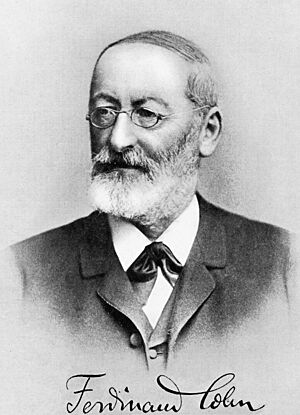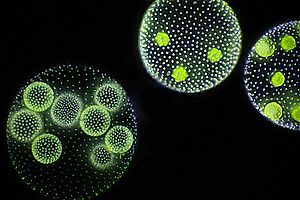Ferdinand Cohn facts for kids
Ferdinand Julius Cohn (born January 24, 1828 – died June 25, 1898) was a German biologist. He is known as one of the main founders of modern bacteriology and microbiology. These are the studies of very tiny living things like bacteria.
Contents
Early Life and Education
Ferdinand Cohn was born in a city called Breslau, which was then part of Prussia. Today, this city is known as Wrocław and is in Poland.
When he was just 16 years old, he started studying botany (the study of plants) at the University of Breslau. Later, he moved to the University of Berlin. By the age of 19, in 1847, he earned his degree in botany from Berlin.
In 1849, Cohn went back to the University of Breslau. He stayed there for his entire career as a teacher and researcher. His father bought him a very good and expensive microscope. This was special because most universities at that time did not have such advanced equipment. This microscope became his most important tool for research in the 1850s.
Discoveries and Contributions
In the 1850s, Ferdinand Cohn focused on how plant cells grow and divide. Later, in the 1860s, he studied plant physiology, which is about how plants work. He was the first scientist to officially group algae as plants. He also explained what makes algae different from other green plants.
From 1870 onwards, Cohn spent most of his time studying bacteria. He wrote and published more than 150 research papers during his life. Because of his work, the University of Breslau became a very important place for studying plant physiology and microbiology.
Classifying Bacteria
Ferdinand Cohn created a way to group bacteria based on their shapes. He divided them into four main groups:
- Sphericals (round shapes)
- Short rods (like tiny sticks)
- Threads (long, thin shapes)
- Spirals (twisted shapes)
Scientists still use this way of classifying bacteria today!
Understanding Spores
Cohn also made a very important discovery about certain bacteria, like Bacillus. He showed that these bacteria can change into a very tough, resting form called an endospore when conditions are difficult. Think of it like a super-strong seed that can survive harsh environments.
This discovery helped solve a big scientific debate at the time about "spontaneous generation." Some people believed that living things, like microbes, could just appear out of nowhere from non-living matter. For example, they wondered why boiled hay or cheese could still grow microbes. Cohn explained that it was because these materials contained heat-resistant spores. Even after boiling, these tough spores could survive and then grow into new microbes when conditions became good again. This proved that life comes from other life, not spontaneously.
See also
 In Spanish: Ferdinand Cohn para niños
In Spanish: Ferdinand Cohn para niños
 | Aurelia Browder |
 | Nannie Helen Burroughs |
 | Michelle Alexander |



